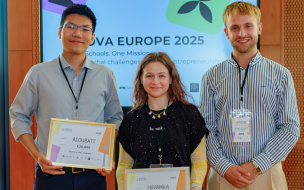For one crafty MBA hopeful, the answer is yes.
When Laurie Pickard completes her self-styled MBA three years from now, she will have done so by forking out just $1,000.
She will have learnt from some of the best business schools in the world, Harvard and Wharton included, all the while still working her full-time job for a US international development agency in Rwanda.
Sounds too good to be true, right?
These are the claims reported by Laurie, who looks set to become the first person to learn a complete MBA syllabus through massive open online courses (Moocs).
Most MBAs spend tens of thousands on a business education (up to $100,000 per year at top universities) and it will come as a shock to hear that the same qualifications can be gained for a fraction of the price.
Top US universities began putting many of their MBA courses online for free, and the trend was quickly picked up in Europe. Grenoble Ecole de Management, a top business school in France, is developing Moocs in geopolitics, innovation and research methods.
And many top MBA programs in the UK, such as Aston Business School, offer online-taught MBAs at a reduced cost.
In the modern age, business students need not leave the comfort of their own homes. These days, you can earn an MBA while in your pajamas, rather than a suit and tie.
Laurie's case goes a long way to explaining the recent trend - and her path will only fuel the debate that the traditional b-school education could be in danger.
Although, she is stricly going for low-cost, online-only programs, she did initially look at "traditional, US-based, high-end, expensive MBAs" - until a friend highlighted a finance course with Mooc provider Coursera.
"While I would like to have an MBA, I don’t want to walk away from the experience with $150,000 in debt, thank you very much," she writes on her blog.
"Would it be possible to create my own MBA using free online courses and other cheap or free materials? Yes, it is possible. And I’m going to try."
A few years ago, it would seem ridiculous to think you could brandish an MBA on your CV without enrolling at a 'proper' business school. Indeed, company recruiters would have laughed you out the building.
But now, Moocs are becoming a permanent entity in the education world. And b-schools are adapting with their own online-only MBA programs, which are often at a reduced cost.
MIP Politecnico di Milano last month launched their new online Executive MBA program, Flex EMBA, which allows the busy working executive to pick and chose their study-time, from home.
The program's director insists that MBAs won't miss out on the networking and career opportunities - flaws typically associated with online programs and Moocs. "The new platform will actually allow students to interact with peers and faculty without going outside the digital environment," said Federico Frattini.
"You can choose the exact months and years that you want to follow the course. You develop your own schedule, your own personalized content of scheduled learning. This is a real advantage."
Yet this debate boils back down to one thing: cost. MIP's program, like many others, will take a significant amount of funding, even if the executive program allows you to stay in industry. For three years, Laurie will still be earning her full-time salary.
She designed her own program by reviewing subjects at top schools' Wharton, Harvard, Stanford and MIT. She said that Moocs are often unreliable, and "you have no idea when they'll be offered again".
Her first "semester" features management, business ethics and leadership, as well as finance and accounting - all staples of the traditional MBA program. She has picked her units from a variety of Mooc platforms, including Open Yale and iTunes U.
Now four months into her self-styled MBA, she has completed five of the 16 course she hopes to finish. "I loved school, so it's kind of like that excitement you get when you first get the course catalog for the semester, and you're looking through it like, 'oh, I want to take that, I want to take that," she said.
It all seems very exciting. And you may even be Google-searching Moocs as you read this article. But they have their faults and many commentators are skeptical. A very low percentage of those enrolled on Moocs actually finish them. And there is, of course, a complete lack of connectivity with students and faculty alike.
Networking is a key component of any b-school experience. Often, it is what graduates cite as their number-one advantage when it comes to securing MBA jobs. One could argue it's what they are spending thousands on.
Laurie's biggest course had 120,000 students. Yet how many of these students could she possibly have connected with on a real level?
The reason most top b-schools put their MBA courses online for free is simply for marketing purposes. David Simmons, Executive Director of the full-time MBA at Cranfield University, made the same point: “They may be watching the same lectures, but it’s not the same experience. I don’t think we’ve reached a point where face-to-face interactions can be replaced by online experience.”
Moocs also differ, widely, in quality - although you could argue the same about different MBA Ranking business schools.
So when it comes to seeking employment, how do you present your non-pay-MBA? Laurie is struggling to find the answer. Most Moocs offer a Statement of Accomplishment (SOA), to prove that you have gained the qualification. But Laurie remains cautious about their value. Her blog, surprisingly, will be the main reference point for potential employers.
"I'm still struggling with how to present it overall," she said. "For me, at this point, it really does hinge on the blog; I can direct somebody there to explore what I've done."
An MBA is an absolutely necessity for many business functions. But Laurie doesn't intend to join a management consultancy or investment bank. She plans to work in sustainable supply chain development. For that line of work, her self-styled MBA may be enough.
"I’m certainly not saying there isn’t any value to a traditional MBA," she said. "However, given my particular situation, the numbers just don’t add up. For me – and, I would expect, for many others – a free online degree seems like the way to go."
So what is the future for the business student student - MBAs for less than a grand? Moocs paving the way to top MBA jobs? The demise of the business school as we know it? It seems unlikely. But watch this space.
To check out Laurie's blog, click here.
RECAPTHA :
4c
77
de
b3








